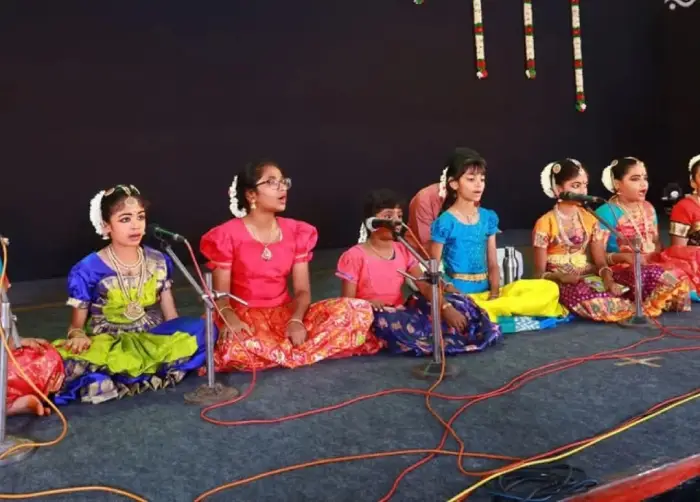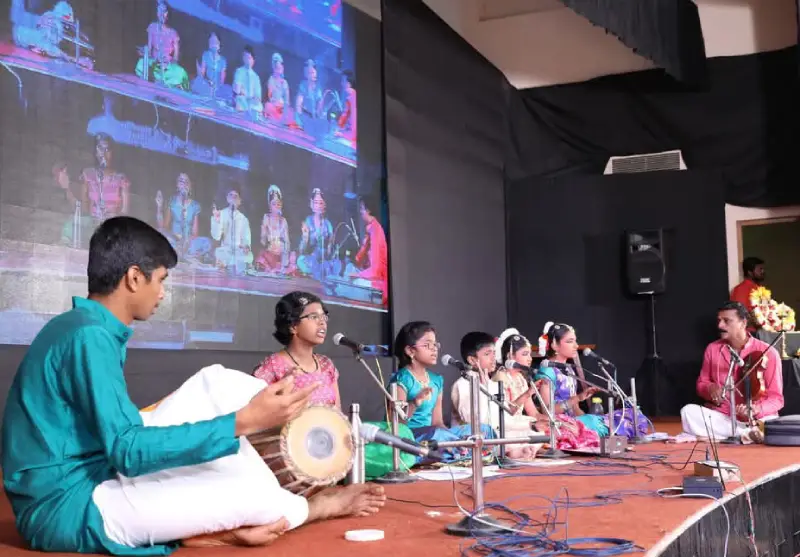Carnatic Vocal
Tradition in Tune, Soul in Every Note
Our vocal training focuses on Indian classical music, including ragas and devotional compositions. Students are taught vocal techniques that help develop their voice and musical expression.

Step into Swaras: From Scale to Soul
Carnatic vocal music is one of the oldest and most profound systems of music in the world. Originating in South India, it represents a harmonious blend of art, science, and spirituality. The significance of Carnatic vocal music extends far beyond its melodic beauty—touching various dimensions of culture, education, personal development, and emotional well-being.
Echoes of Tradition and Culture
Carnatic music is deeply embedded in the cultural and spiritual fabric of India. Rooted in ancient scriptures like the Vedas and evolved through centuries of refinement by legendary composers such as Tyagaraja, Muthuswami Dikshitar, and Shyama Shastri, it offers a direct connection to India’s timeless spiritual traditions. Most compositions are devotional in nature, sung in praise of deities, and are steeped in philosophical depth. Learning Carnatic vocal not only imparts musical skills but also introduces students to languages such as Sanskrit, Telugu, Tamil, and Kannada, helping preserve India’s literary heritage.
Beyond Notes: Melodies of the Soul
At the heart of Carnatic music lies the human voice—an instrument of immense emotional range and technical capability. In Carnatic vocal tradition, the voice is not just a medium of sound, but a conduit for spiritual expression, lyrical storytelling, and artistic improvisation. The training involved in mastering Carnatic vocal music is rigorous and transformative, shaping not only one’s voice but also one’s musical intuition, imagination, and emotional depth.
As a vocal-centric tradition, Carnatic music places strong emphasis on mastering voice modulation, tone control, and emotional expression. Through a rigorous system of ragas (melodic modes) and talas (rhythmic cycles), students learn to render compositions with precision and feel. The training hones the voice as a powerful instrument capable of intricate ornamentations (gamakas), improvisations (manodharma), and soulful expression.
Carnatic Vocal: Tradition in Practice
The intellectual demands of Carnatic music are significant. From the very first lesson, the student is introduced to a world of abstract thinking and pattern recognition. Swaras (musical notes) are not just sung—they’re understood, placed within the framework of ragas and talas, and eventually manipulated during improvisation. It enhances analytical thinking, concentration, and auditory memory, as students learn to identify subtle pitch differences, complex rhythm patterns, and lyrical nuances. The art of improvisation encourages creativity and quick thinking. At the same time, the emotionally rich nature of ragas fosters empathy, emotional intelligence, and a deep sense of self-awareness.
While the brain is busy decoding patterns, the heart is deeply engaged in Carnatic music. Each raga evokes a distinct emotional flavor—called rasa. Some ragas may inspire devotion, while others evoke longing, joy, serenity, or even heroic strength.
Every Note Nurtures Culture, Discipline, and Expression
The journey of learning Carnatic vocal is one of discipline and dedication. Regular practice (sadhana) instills a strong work ethic, patience, and a growth mindset. It is also meditative in nature—the repetitive patterns and devotional content can create a calming, almost transcendental experience. For many, singing becomes a form of emotional release and spiritual connection, promoting mental peace and mindfulness.
Sing. Feel. Evolve.
Today, Carnatic music has gained recognition across the globe. Vocalists and students from diverse cultures are embracing its richness, seeing it as a bridge between the traditional and the modern. Whether pursued as a profession, hobby, or spiritual practice, Carnatic vocal music offers lifelong enrichment—emotionally, intellectually, and artistically.
Course Structure
- Basic Vocal Exercises
- Alankaaras and Speed Variations
- Introduction to Ragams
- Thalam Concepts
- Theory
- Learning and Practicing compositions
- Performance and Presentation Skills

